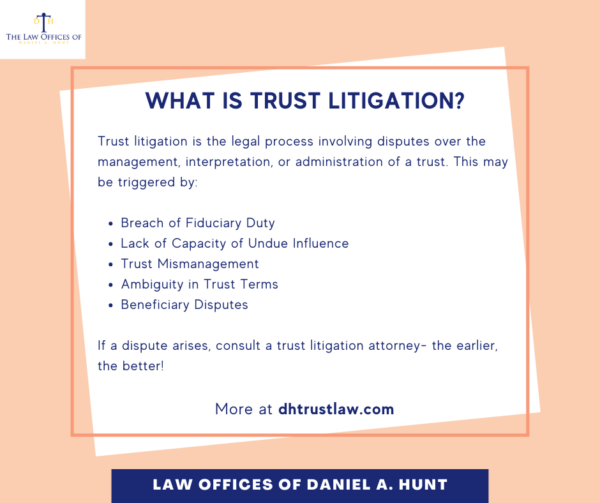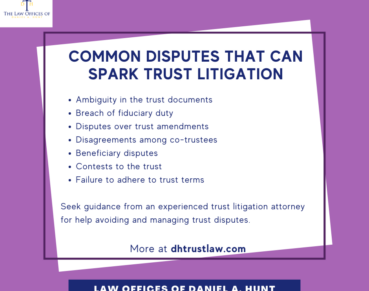What is Trust Litigation?

Trusts are legal arrangements where one party, known as the “settlor” or “grantor,” places assets into the care of another party, called the “trustee,” for the benefit of third parties, known as the “beneficiaries.” While trusts are meant to provide a clear structure for asset distribution, disagreements or conflicts can still arise, which may lead to litigation. In this blog post, we’ll answer the question: “What is trust litigation?”
Common Reasons for Trust Litigation
Trust litigation is the legal process involving disputes over the management, interpretation, or administration of a trust. Trust litigation typically arises when there is a dispute about how the trust is managed or how its assets are distributed. Here are some of the most common reasons a trust may end up in litigation:
- Breach of Fiduciary Duty: Trustees are legally bound to act in the best interest of the beneficiaries. If a trustee mismanages the trust, fails to follow the terms of the trust document, or engages in self-dealing (using trust assets for personal gain), beneficiaries can bring legal action against the trustee.
- Lack of Capacity or Undue Influence: Disputes often occur when beneficiaries believe that the settlor was not of sound mind or was unduly influenced when creating or modifying the trust. In these cases, litigation may be necessary to determine whether the trust is valid.
- Trust Mismanagement: If the beneficiaries suspect the trustee is not properly managing the trust’s assets, they may sue the trustee. This could include misappropriating trust funds, commingling personal and trust assets, failure to invest assets prudently, improper accounting, or taking excessive trustee fees. Litigation might be pursued to remove the trustee and seek financial remedies.
- Ambiguity in Trust Terms: Sometimes, the language in the trust document is unclear or ambiguous and open to multiple interpretations. Disputes may arise over the meaning of specific provisions, leading to trust litigation. The court may need to interpret the trust to resolve such disagreements.
- Beneficiary Disputes: Conflicts between beneficiaries can also lead to litigation. Beneficiaries may disagree about how the trust should be administered, how assets should be distributed, or whether the trustee is fulfilling their duties properly.
The Litigation Process
Trust litigation generally follows a similar process to other forms of civil litigation but involves issues unique to trusts:
- Filing a Petition: The first step in trust litigation is often the filing of a petition in probate court. The petition may request removal of the trustee, enforcement of trust terms, or resolution of ambiguities in the trust.
- Discovery: Both sides gather evidence, which may include trust documents, financial records, and depositions of the trustee, beneficiaries, or others involved in the trust administration.
- Mediation or Settlement: In many cases, trust disputes can be resolved through mediation before reaching trial. This allows the parties to resolve their disputes without the time and expense of a full trial.
- Trial: If mediation is unsuccessful, the case may go to trial. At trial, both sides present their evidence, and a judge decides how the trust should be interpreted or administered.
- Appeal: After a trial, either party may choose to appeal the decision to a higher court if they believe there was an error in the legal process or in how the court interpreted the trust.
Preventing Trust Litigation
While trust litigation can be necessary to resolve serious disputes, it is often time-consuming and costly. The best strategy is prevention, and here are three ways to prevent litigation:
- Clear and Detailed Trust Documents: Ambiguities in trust documents often lead to disputes. A well-drafted trust document, prepared by a qualified estate planning attorney, can clearly state your intentions and prevent misunderstandings or conflicts.
- Regular Trust Reviews: Trusts should be reviewed periodically, especially when significant life changes occur, to ensure they reflect your wishes and current estate planning laws.
- Professional Fiduciaries: If you worry that your beneficiary children will fight after your death, consider choosing a neutral professional fiduciary to act as your successor trustee. A neutral third party is less likely to be accused of bias or misconduct and can help prevent conflicts that might arise if a family member were to serve in this role.
Seek Professional Counsel
If you are involved in a trust dispute or suspect that one is coming soon, it is crucial to promptly seek the advice of an experienced trust litigation attorney to protect your rights and interests. Most estate planning lawyers have little to no experience with litigation, so you’ll want to seek out an attorney who specializes in trust litigation.
A trust litigation lawyer can help you communicate with the other parties, gather evidence, represent you in mediation, and go to trial on your behalf if necessary.
If you have any questions about trust litigation, feel free to contact our law firm.
Law Offices of Daniel A. Hunt
The Law Offices of Daniel A. Hunt is a California law firm specializing in Estate Planning; Trust Administration & Litigation; Probate; and Conservatorships. We've helped over 10,000 clients find peace of mind. We serve clients throughout the greater Sacramento region and the state of California.




